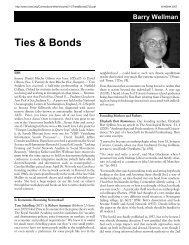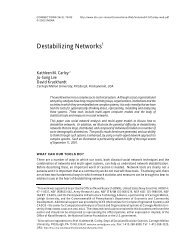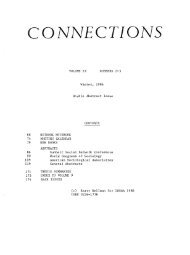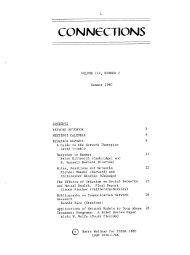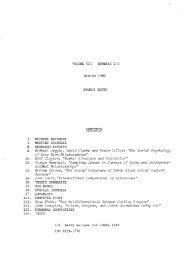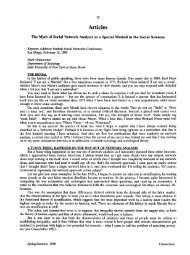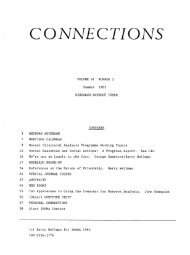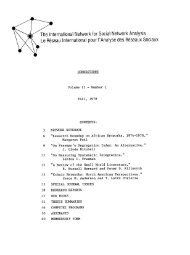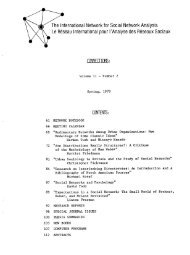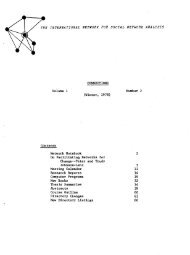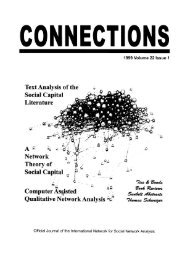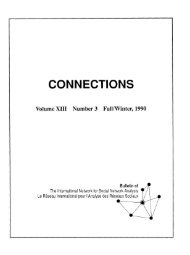Sunbelt XXXI International Network for Social Network ... - INSNA
Sunbelt XXXI International Network for Social Network ... - INSNA
Sunbelt XXXI International Network for Social Network ... - INSNA
Create successful ePaper yourself
Turn your PDF publications into a flip-book with our unique Google optimized e-Paper software.
Micro‐mobilization In A Scientific/intellectual Movement: The Case Of Recovery In Mental Health Services ResearchMcCranie, Ann L.<strong>Network</strong>s, Collective Action and <strong>Social</strong> MovementsScientific <strong>Network</strong>s, Mental Health Services, Academic <strong>Network</strong>s, Mental Health, <strong>Social</strong> Movement Theory, Co‐authorship <strong>Network</strong>THURS.AM1The scientific/intellectual movement (Frickel and Gross 2005) of research and promotion of "recovery" in/from mental illness has grown in prominence in themental health services research field in the past 20 years. The network of behavioral researchers who have worked to both promote and harness this concepthas grown dramatically, as has the academic literature surrounding the topic. Amidst this, there is no clear consensus on exactly what is meant by this concept.However, the calls <strong>for</strong> "recovery oriented services" continue to be influential in policy decisions at the state and federal level, even as what is meant by thosecalls is unclear. This study focuses on the co‐authorship activity of the scholars who have both defined and invoked this concept in their research over the last20 years, with an eye to understanding how the different definitions of recovery have been embraced by different segments of the mental health servicesliterature over time. It combines a content coding of articles on recovery with a positional analysis to determine how micro‐mobilization contexts (usingdifferent definitions of the concept) within the recovery scientific/intellectual movement have emerged, with some attention paid to which sets of meaningsand contexts have been most successful in the policy world.Mining Large‐scale Online Communities: The Development And Dispersion Of Tools For Analyzing Collaborative Processes And StructuresBritt, Brian C.; Matei, Sorin A.; Braun, DavidAnalyzing <strong>Network</strong> DataOn‐line Communities, <strong>Network</strong> Analysis, Wikipedia, Data Mining, Technology, MotivationFRI.PM1Wiki‐based social media sites such as Wikipedia have become very successful collaborative frameworks, to some degree supplanting previous plat<strong>for</strong>ms andtools. Some of their characteristics such as ad‐hoc organization, role and norm fluidity, and a relatively flat organizational structure suggest the emergence of anew social‐structural <strong>for</strong>m of organization. Yet, very little is known about the global characteristics of this <strong>for</strong>m and most importantly, what drives the mostsuccessful collaborative communities. Of particular interest is the relationship between collaborative ties and motivation to contribute to wiki sites. Our workutilizes innovative methodologies to delve beyond surface‐level, node attributes, focusing on understanding how node embeddedness motivates contributionsto Wikipedia and other similar task‐oriented online communities. We mined the full Wikipedia corpus of edits from 2001‐2010 and have developed an analyticframework that allows us to ask such questions in a systematic manner. Especially productive is our approach to determining if social entropy andassortativity/dissasortativity can explain social motivation and ultimately Wikipedia’s success. In addition, we have developed a research plat<strong>for</strong>m, VisibleSymbiosis, which will invite researchers from throughout the world to further explore the entire Wikipedia corpus.



